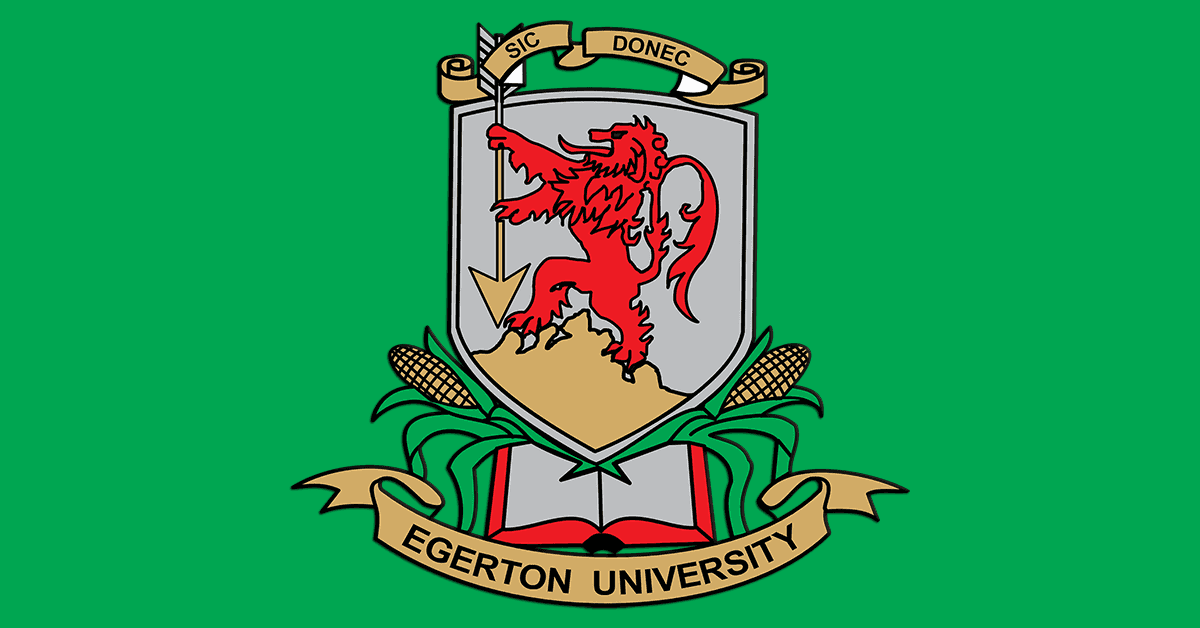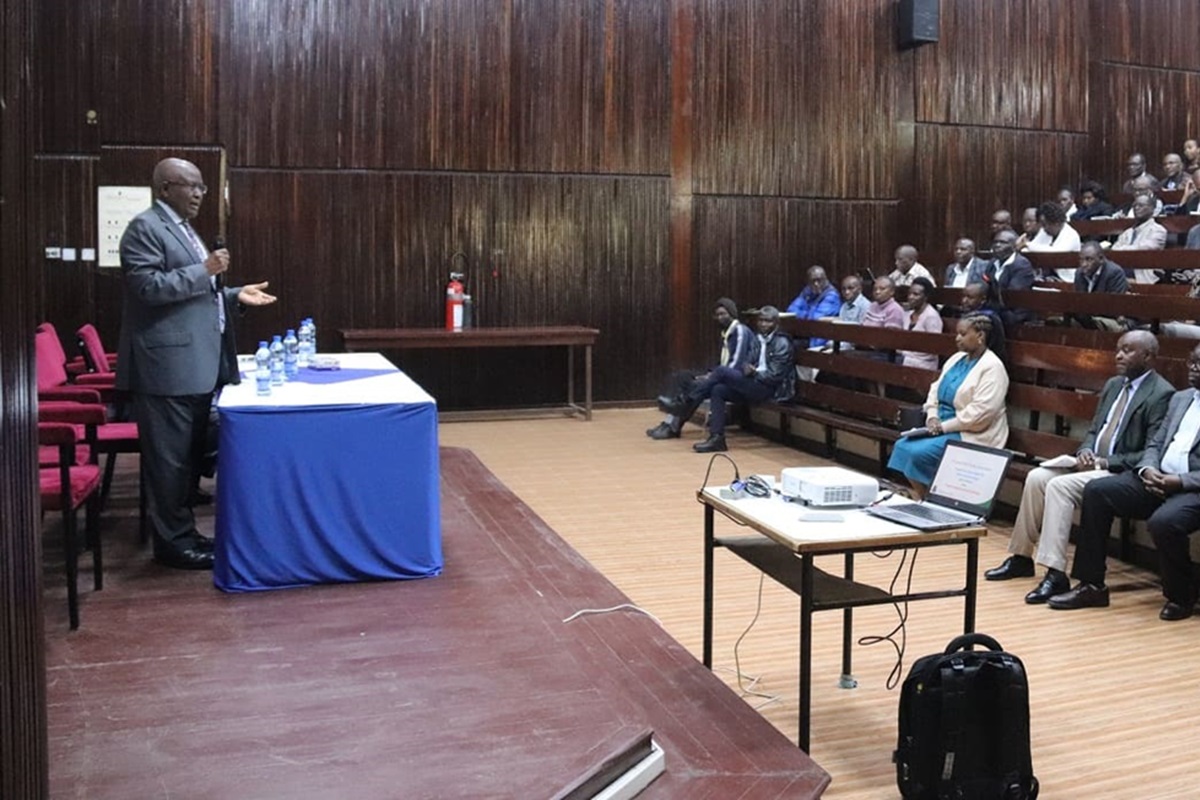Egerton University Participation in the 2nd Multisectoral Conference on Science, Technology and Innovation (MS-COSTI 2)
Egerton University participated in the 2nd Multisectoral Conference on Science, Technology and Innovation (STI) that was held from 23rd to 26th May 2023 at Safari Park Hotel, Nairobi. The conference was organized by the National Commission on Science, Technology and Innovation (NACOSTI) in partnership with the National Research Fund (NRF), and Konza Technopolis Development Authority (KoTDA).
The theme of the conference was, “Harnessing Science, Technology and Innovation (ST&I) for Food Security and Public Good in a Transformational Digitized Economy”. The aim of the conference was to facilitate a multifaceted forum of national and international discourse to deliberate, network, partner, share experiences and resolve how best to deploy ST&I for the prosperity of humanity. The conference focused on a technology-driven, innovation-led, inclusive, sustainable development agenda.
The scope of the multi-faceted Conference forum comprised of an inter-ministerial High-Level Dialogue on “Infusion of STI into National Production and Security Systems”, scientific and technological presentations, Science, Technological and Innovation exhibitions, and Science and Technology Week. During the four day conference, invited speakers from different government ministries and organizations made presentations focusing on different Lead thematic areas that included: STI for Food Security, Nutrition, and Harnessing of Indigenous Knowledge;, R&D Strengthening, Priorities, Financing and Infrastructure; STI for Urban, County, and Resilient Communities; Health Security and Substance Abuse Mitigation; STI for National Security, Public Safety and Emergency Response; The Fifth Industrial Revolution, Data Governance, and Emerging/ Frontiers Technologies; STI Education, Communication, Talent Development, and Next generation Workforce; STI Inclusivity, Advocacy and Diplomacy; Strategic Multi-agency, Sectoral, and International Cooperation and Partnerships; STI for SDGs, Climate Change Mitigation and Harnessing of the Blue Economy; Fostering Technology Protection, Diffusion, and Commercialization through Strategic Investment in SMEs, Start-ups, and Smart Technologies; and STI Mainstreaming in MDAs through Policy, Governance, Legal, Institutional, and Services Delivery Reforms.
The Vice-Chancellor Egerton University Prof. Isaac O. Kibwage was in attendance at the conference, where the fact Kenya has been selected by the International Centre for Genetic Engineering and Biotechnology (ICGEB) Board of Governors to host its first Regional Research Centre (RRC) in Africa, to complement the one in China was recognized. The fact that Egerton University’s had won the bid to host the ICGEB Regional Research Centre at its Campus in Njoro was applauded and the VC challenged to ensure that the RRC was established in the next one year. The RRC would specialize in food safety, molecular plant breeding, molecular plant pathology and entomology, genetic biofortification, development of molecular diagnostic tools and their applications and bioprospecting for biopesticides and bioactive compounds.
The conference provided a great opportunity for the various NRF funded research capacity building, multidisciplinary research, Bilateral and Multi-lateral research programmes, and research infrastructure to share and showcase their achievements and research outputs through parallel research dissemination workshops and exhibitions. Principal Investigators (PIs) for research projects funded by NRF used the opportunity to disseminate their research outputs and demonstrate how research and innovation can be translated into practical applications that benefit communities and industries, inform decision-making, improve practices and promote public understanding of scientific issues leading to national economic growth. Three PIs from Egerton University with NRF funded projects made presentations during the parallel sessions. Prof. Charles Muleke, gave a presentation on the project entitled, ‘Enhancing public health awareness on food safety risks associated with livestock feeding practices in the peri-urban slums of Kisumu City, Kenya. The purpose for this project was to promote good livestock feeding practices within peri-urban slum producers to guarantee food safety to consumers. The main socio-economic opportunity and environmental impact from this research work on toxic heavy metal levels greatly informed the decision for relocation of the Kachok dumpsite previously located near Kisumu Sports Stadium for safe food production within peri-urban livestock system. The Education and Training for Sustainable Agriculture and Nutrition in East Africa (EaTSANE) project presentation was done by the PI from Egerton University, Dr. Lydiah Waswa. This projects aimed at implementing sustainable farming practices and healthier diets of farming households in Kenya and Uganda by diversifying the food system using a participatory-action-learning approach. The action research approach facilitated farmers’ behaviour change towards more sustainable farming, crop diversification and improved diets through increased crop yields. The need for close collaborations among stakeholders to facilitate creation of niches in which farmers and researchers contextualized the research activities for often complex variables within the farmer environment was highlighted in this project. The other NRF funded project domiciled at Egerton University was lead by Prof. Julius Kipkemboi, entitled, Real-Time Environmental Monitoring Using Innovative Wireless Sensors Technology: Using Lake Nakuru as case study.
At the end of the conference, participants came up with a number of resolutions to effectively harness STI for national security, public safety and inclusive sustainable growth in twelve key priority areas for STI sector including food security, nutrition and harnessing of indigenous knowledge, national security, public safety and emergency response, health security and substance abuse mitigation, education, communication, talent development and next generation etc. Recognizing that the government had taken bold steps to strengthen the Science, Technology, and Innovation sector as an anchor in the the Botton-Up Economy Transformation Agenda (BETA), the conference resolved that there was need for more funding for Science, Technology and Innovation sector in line with the provisions of the Science, Technology and Innovatio Act 2013 (Rev. 2014) that stipulates 2% of GDP. Recognizing the urgent need to attract private sector involvement in research funding and implementation of research outcomes, the conference resolved to declare the upcoming financial year of 2023/ 2024 the year of Technology and Innovation Diffusion and Commercialization, among other resolutions.
Some of the submissions made by key speakers at the end of the conference included the need to use science to transform societies, the need for integrity in research, and the fact that the future of Kenya is in the hands of young people, hence the need to mentor them to take up the mantle in promoting the national agenda through effective STI.
The conference closing remarks were given by Major General Waliaula who acknowledged the conference organizers and participants, particularly the presence of school children who need to be mentored in STI as the future was in their hands.
Written by: Dr. Lydiah Waswa.
Directorate of Marketing and Resource Mobilization
Email:This email address is being protected from spambots. You need JavaScript enabled to view it.







